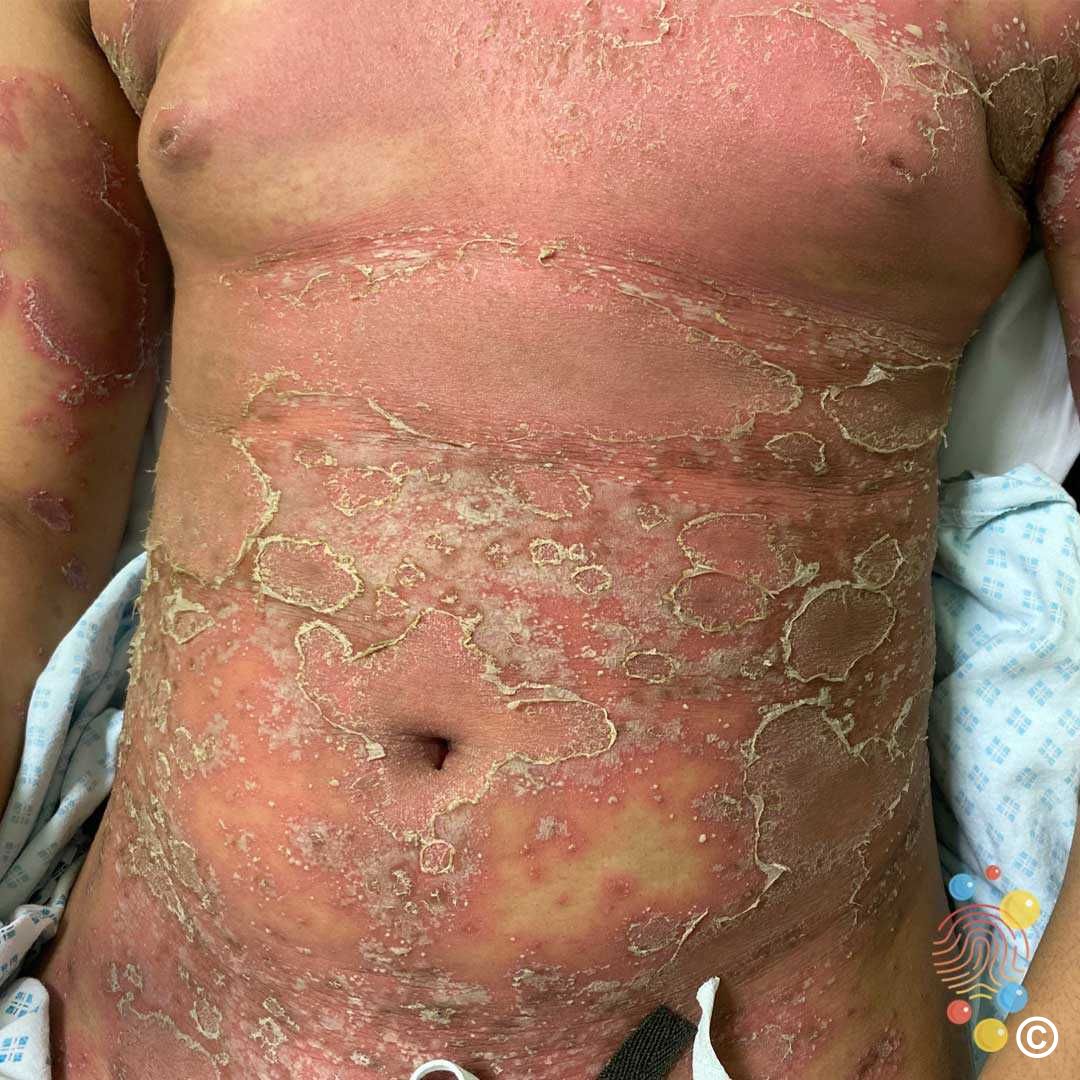What are the symptoms of pustular psoriasis?
Pustular psoriasis is a type of psoriasis characterized by the presence of pustules (blisters filled with non-infectious pus) on the skin. The symptoms of pustular psoriasis include:
- Pustules: Small, raised, white or yellowish pustules appear on red, inflamed skin. These pustules are not infectious and are filled with a collection of white blood cells and other inflammatory cells.
- Red, Inflamed Skin: The skin surrounding the pustules is often red and inflamed. It may appear swollen and irritated.
- Scaling and Peeling: As pustules dry up, they may be covered with a layer of dry, flaky skin that can peel off. The scaling is typically thicker and more pronounced than in other forms of psoriasis.
- Itching and Burning: The affected areas can be itchy, and there may be a burning or stinging sensation in the areas with pustules.
- Pain: In severe cases, pustular psoriasis can be painful due to the inflammation and skin damage.
- Fever and Malaise: In some cases, particularly with generalized pustular psoriasis, systemic symptoms such as fever, chills, and a general feeling of being unwell can occur.
- Nail Changes: In some cases, pustular psoriasis can affect the nails, leading to changes such as pitting, thickening, or separation of the nail from the nail bed.
Pustular psoriasis can range from localized forms, affecting small areas like the hands or feet, to more generalized forms, where the pustules cover large areas of the body. If you suspect you have pustular psoriasis or are experiencing severe symptoms, it is important to consult a healthcare provider for an accurate diagnosis and appropriate treatment.
What are the causes of pustular psoriasis?
Pustular psoriasis is a type of psoriasis with several potential triggers and contributing factors. The causes of pustular psoriasis are not fully understood, but some key factors include:
- Genetic Factors: There is a genetic component to psoriasis, including pustular psoriasis. Individuals with a family history of psoriasis are at a higher risk.
- Immune System Dysfunction: Psoriasis is an autoimmune condition where the immune system mistakenly attacks healthy skin cells. This dysfunction leads to inflammation and the formation of pustules.
- Skin Injury or Trauma: Physical damage to the skin, such as cuts, burns, or other injuries, can trigger or exacerbate pustular psoriasis. This is known as the Koebner phenomenon.
- Infections: Infections, particularly streptococcal throat infections, can trigger or worsen pustular psoriasis. Systemic infections can also contribute to flare-ups.
- Medications: Certain medications, including systemic steroids, lithium, and certain antimalarials, can trigger or aggravate pustular psoriasis.
- Stress: Emotional or psychological stress is a known trigger for many types of psoriasis, including pustular psoriasis. Stress can exacerbate symptoms and trigger flare-ups.
- Hormonal Changes: Hormonal changes, such as those occurring during pregnancy or puberty, can influence the development and progression of pustular psoriasis.
- Alcohol and Smoking: Excessive alcohol consumption and smoking can worsen psoriasis symptoms or trigger flare-ups.
- Environmental Factors: Environmental factors, including climate changes, exposure to harsh weather, or irritants, can contribute to the onset or worsening of pustular psoriasis.
- Underlying Health Conditions: Conditions such as metabolic syndrome, diabetes, and obesity may also influence the development and severity of pustular psoriasis.
Understanding and managing these triggers can help control the condition and reduce the frequency and severity of flare-ups. If you suspect pustular psoriasis or experience severe symptoms, consult a healthcare provider for diagnosis and appropriate treatment.
What is the treatment for pustular psoriasis?
The treatment for pustular psoriasis aims to reduce inflammation, control symptoms, and manage flare-ups. The approach can vary depending on the severity and extent of the condition. Common treatments include:
- Topical Treatments: These are applied directly to the skin and may include corticosteroids to reduce inflammation, topical retinoids to normalize skin cell production, and coal tar or calcipotriene (a vitamin D analog) to control symptoms.
- Systemic Medications: For more severe cases, oral or injected medications that affect the whole body might be used. These can include:
- Methotrexate: Reduces inflammation and slows down the production of skin cells.
- Cyclosporine: Suppresses the immune system to decrease inflammation.
- Acitretin: A systemic retinoid that helps to normalize skin cell turnover.
- Biologics: These are newer medications that target specific immune system proteins involved in psoriasis. Examples include adalimumab, etanercept, and infliximab.
- Phototherapy: This involves exposing the skin to controlled amounts of ultraviolet (UV) light. It can help reduce symptoms and control flare-ups.
- Supportive Care: Keeping the skin moisturized with emollients can help reduce dryness and irritation. Avoiding known triggers, such as stress, certain medications, and environmental irritants, is also important.
- Lifestyle Modifications: Adopting a healthy lifestyle can help manage the condition. This includes maintaining a balanced diet, avoiding excessive alcohol, quitting smoking, and managing stress effectively.
- Treating Underlying Conditions: If pustular psoriasis is linked to another health condition or medication, addressing the underlying issue or adjusting medications may help.
Treatment should be tailored to the individual based on the severity of the condition and their overall health. Regular follow-ups with a healthcare provider are important for monitoring progress and adjusting treatment as needed.

Leave a Reply
You must be logged in to post a comment.